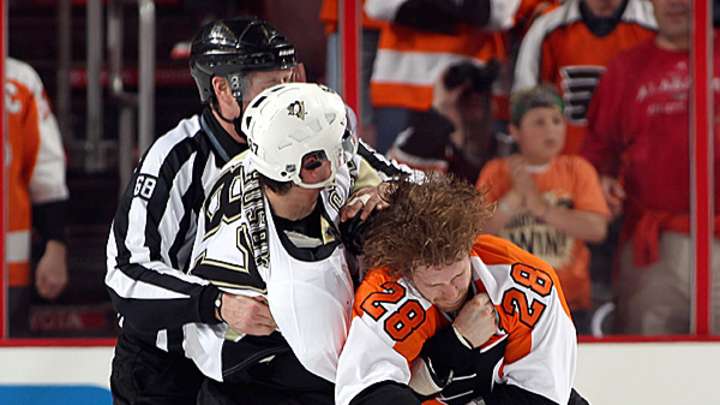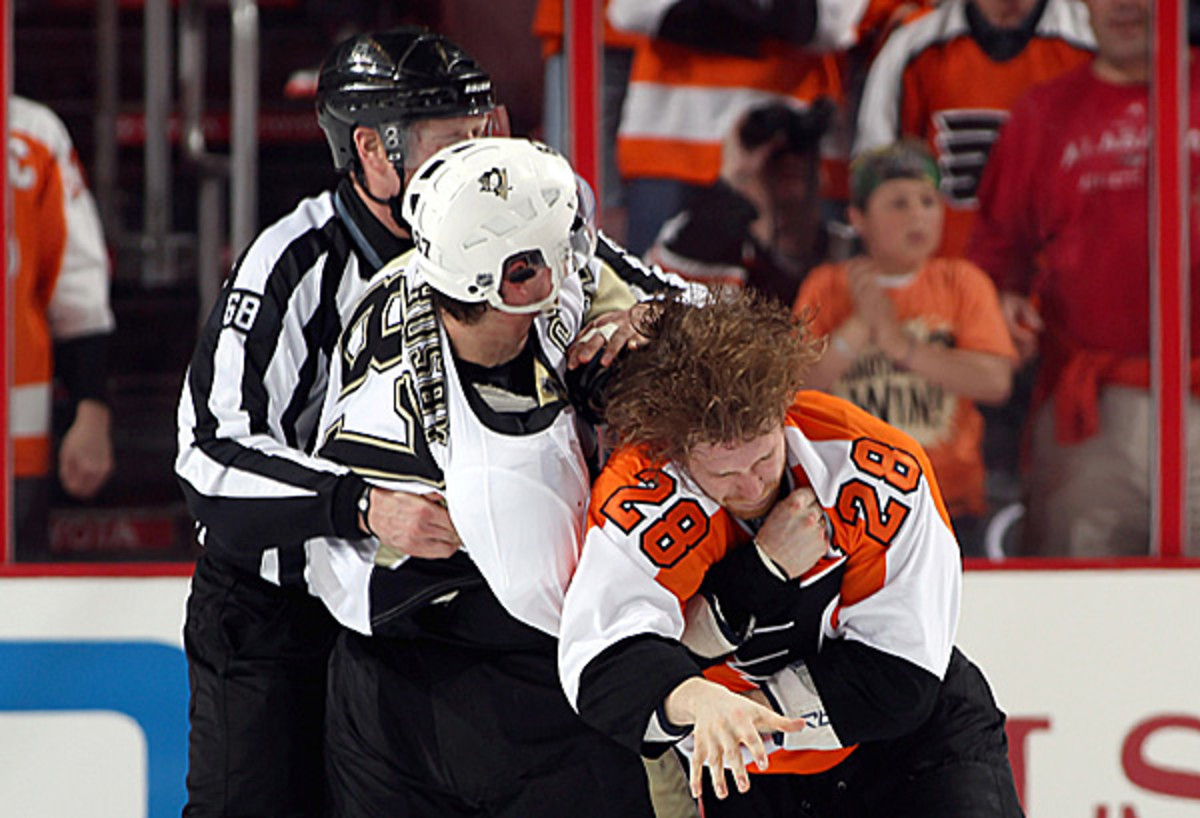Mayhem reigns in Stanley Cup playoffs


By Stu Hackel
After watching too much go too far during the last five days, I think it should be obvious to anyone who has any sense of proportion that the Stanley Cup playoffs are out of control. There have been head-rammings, sucker punches, maulings and ambushes, all of which is apart from the more commonplace vendettas, elbows, crosschecks, spearing, charging, knee-to-knee shots and line brawls that we've come to expect each spring.
This isn't just hard hockey. It is, as one of the sport's prominent personages called it during the first phone call I got on Monday morning, "a disgrace."
I began watching the NHL 50 years ago and I can't recall ever seeing anything like this, not even in the game's darkest days of the mid-1970s. In more games than not, the play has degenerated into open warfare.
To some extent, it was predictable. When the NHL allowed Shea Weber to escape relatively unpunished after smashing Henrik Zetterberg's head into the glass on the playoffs' opening night last Wednesday, the only conclusion that I could take away from the league's inaction was that the standards of permissible player behavior this spring have been relaxed. And that is how the players have proceeded.
NBC's Pierre McGuire made note of that on Monday morning over Ottawa radio Team 1200 with John Rodenburg and Steve Warne, two longtime observers of the game who also seemed perplexed by what they've witnessed so far (audio). "Clearly, the message was sent and the optics are pretty much there," McGuire said, referring to the league letting Weber off the hook. "And they didn't take advantage of the opportunity to send a message early on in the playoffs....Clearly, something has gone awry....I have never seen the intensity level like this in my 23 years in this league. Never. It's the most intense I've ever seen this league. I don't know if it's because of parity. I don't know if it's because of coaching being better or motivational speeches or players being so big and strong and they really want to win the Cup. I don't know what it is."
Subsequently -- and probably too late -- we've seen a few suspensions as the league tries to reclaim some semblance of order. Almost everyone fully expects that the Penguins' Arron Asham will sit after his brutal attack Sunday on Philadelphia's Brayden Schenn.
Asham's act was an over-the-top response to a clean check, something we've seen far too often in the NHL during the last few years. The others are, perhaps, not that extreme, but Asham's was the same sort of over-reaction nonetheless, and the fact that the others are infrequently penalized has created an atmosphere in which Asham felt he was entitled to avenge a clean hit.
We also don't know yet what Andrew Shaw of the Blackhawks will get for running Coyotes goalie Mike Smith on this play Saturday:
Shaw got a charging major and a game misconduct. A hearing on Monday will determine if he sits or not. There has been an emphasis on protecting goalies since Boston's Milan Lucic ran Ryan Miller last November, concussing the Sabres goalie, so a suspension is possible although Smith didn't suffer an injury. That could minimize how long Shaw sits, if at all.
We do know that the Rangers' Carl Hagelin was hit with a three-game ban for this elbow to the head of Ottawa's Daniel Alfredsson, which has rendered the Senators' captain questionable for the future of this series.
Still, there's always uncertainty and questions about these suspensions. It's folly to try guessing how they will turn out. Matt Carkner of the Senators got only one game for fighting an unwilling combatant when he jumped the Rangers' Brian Boyle, also on Saturday. But -- as NHL VP Brendan Shanahan acknowledged in his ruling (video) -- this was something that Carkner had done before. Where is the additional punishment for a repeat offender?
And yet, there was no hearing at all for the Sharks' T.J. Galiardi, who launched himself into Andy McDonald of the Blues on Saturday, his shoulder hitting McDonald's head with enough force to crack McDonald's helmet. One Blues fan went so far as to make his own "Shana-ban video" to show why he believed Galiardi should have received supplemental discipline.
The Blues aren't innocents in this series, either, as reports surface that Vladimir Sobotka sucker-punched the Sharks' Dominic Moore, breaking Moore's nose during a wild message-sending melee at the final buzzer. (Weren't message-sending melees at the final buzzer frowned upon in the NHL? There have been a few of them.) Such a thing is usually worth a suspension, but no video of that specific episode was shown on the telecast and, with the officials occupied by other fights, it probably wasn't included in the refs' report of the match.
We can complain all we want about how fair or how long suspensions are, but the fact is that the NHL doesn't want to suspend players, and when it must, it doesn't want them out very long, especially during the playoffs. Many want to blame Shanahan for his increasingly soft punishments, but, as TSN's Bob McKenzie pointed out to Elliot Price and Shawn Starr over Montreal Radio 990 on Monday morning (audio), "The way discipline is handled in the National Hockey League is institutionalized and there's no one individual that is going to completely overhaul or revamp this thing. And the discipline the NHL gets is the discipline the NHL wants. And that's as a group, from the general managers to the players, the players association, coaches, owners, and everybody directly involved -- the stakeholders in the game. And there's a huge dichotomy between the way the fans and the media view it for the most part and the way all the other stakeholders view it -- with the exception of whoever's ox got gored that particular day."
A breakdown this systemic doesn't just lie with the league office. The referees are clearly overmatched by the players. Their inability to control the mayhem has never been more pronounced and there has been a run of strange calls, non-calls and weak calls, again starting with the Weber-Zetterberg incident, for which Weber got only a minor for roughing and not a match penalty, which he deserved. (Former NHL ref Kerry Fraser on TSN.ca made that point and a few more in his fine blog post last Friday.)
McGuire, from his unparalleled perch between the benches at Sunday's Penguins-Flyers game, made strong points about how the refs mishandled a roughing call on James Neal, who should have gotten a misconduct and been sent off the ice in a game that had already been decided. His two-minute minor kept him around so the Flyers could attack him as he skated to the box. Philly was retaliating for his brutal flattening of Sean Couturier, who has done such a magnificent checking job in helping to shut down Pittsburgh's attack, especially Evgeni Malkin. Here's that whole sequence:
There has been no shortage of strange calls. Why, for example, did Michael Del Zotto of the Rangers escape without a penalty after he crosschecked Ottawa's Kyle Turris during Nick Foligno's game-tying tally? It's a mystery.
[vodpod id=Video.16373331&w=425&h=350&fv=hlg%3D20112012%2C3%2C112%26amp%3Bevent%3DNYR736%26amp%3Bserver%3Dhttp%3A%2F%2Fvideo.senators.nhl.com%2Fvideocenter%2F%26amp%3Bpageurl%3Dhttp%3A%2F%2Fvideo.senators.nhl.com%2Fvideocenter%2F%26amp%3Bnlwa%3Dhttp%3A%2F%2Fapp2.neulion.com%2Fvideocenter%2Fnhl%2F]
In general, the referees seem unable to control the heightened level of play. The NHL went to a two-ref system 10 seasons ago, certainly a necessity in a game played at its current pace. But the downside is that it doubled the number of refs who work NHL games, and one wonders if the talent pool and development system have been strong enough to meet the demand, especially with so many experienced refs having retired during the last few years.
But for all the shortcomings one can point to in the league office and among the officials, the problem begins with the players themselves. The referees have to keep the peace, and the NHL Department of Player Safety must supplement their efforts and help set the tone, but it's the players who act the way they do and it can be hard to rein them in. "There's so much emotion in these playoffs that sometimes teams lose games because they get too wrapped up in the emotions of the game," McGuire said on Monday morning. Sometimes, the best efforts of the league, the refs and the coaches aren't enough.
On Sunday night, the Canucks lost their focus while trying to get even after they became incensed by Kings captain Dustin Brown's hit on Henrik Sedin (video). It was a hit that both Sedin and his coach, Alain Vigneault, later said they had no problem with. The Canucks also lost the game, and the Presidents' Trophy-winners are now staring at quick, first-round elimination.
At times like that, the players' internal leadership needs to take hold. But it doesn't always happen, and when you see a team captain like Sidney Crosby acting as he did on Sunday -- petulantly swatting at Jakub Voracek's glove and justifying it with the all-purpose "It's the playoffs" cliche, how does that help his team win? It doesn't.
"There's not a bigger Sidney Crosby fan in the National Hockey League than me in terms of the way that he plays the game, the passion he's got, the dynamic skills and ability he that possesses," said McKenzie on TSN 990 radio Monday morning, "but I'll tell you what -- Marc Crawford said it last night on TSN, he didn't like that public response to the media postgame and that was not a player who at least publicly was willing to admit, 'We've got a problem here, and the problem is that we're not focused enough.' The fact of the matter is that Sidney Crosby's energy was misdirected yesterday. And he wasn't alone. It's an epidemic. It belongs to Marc-Andre Fleury, it belongs to Sidney, it belongs to Evgeni Malkin, it belongs to James Neal....Chris Kunitz, Kris Letang, up and down the lineup of the Pittsburgh Penguins. The number one problem right now is that adversity has hit and they are crumbling. They are losing their composure."
So, too, it seems, is the entire NHL. It's not a pretty picture. In fact, it's damn ugly.
COMMENTING GUIDELINES: We encourage engaging, diverse and meaningful commentary and hope you will join the discussion. We also encourage, but do not require, that you use your real name. Please keep comments on-topic and relevant to the original post. To foster healthy discussion, we will review all comments BEFORE they are posted. We expect a basic level of civility toward each other and the subjects of this blog. Disagreements are fine, but mutual respect is a must. Comments will not be approved if they contain profanity (including the use of abbreviations and punctuation marks instead of letters); any abusive language or personal attacks including insults, name-calling, threats, harassment, libel and slander; hateful, racist, sexist, religious or ethnically offensive language; or efforts to promote commercial products or solicitations of any kind, including links that drive traffic to your own website. Flagrant or repeat offenders run the risk of being banned from commenting.
